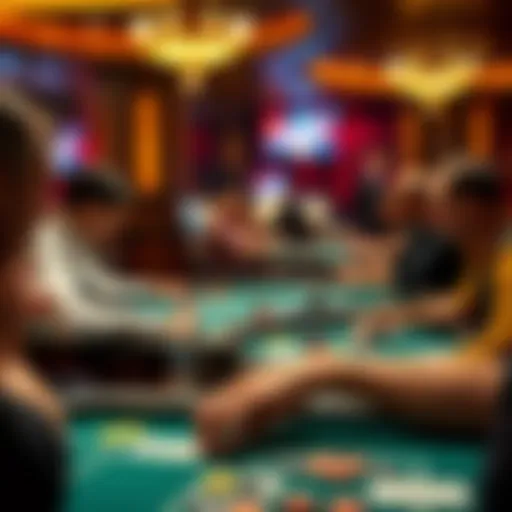Understanding Blackjack Card Meaning and Its Impact
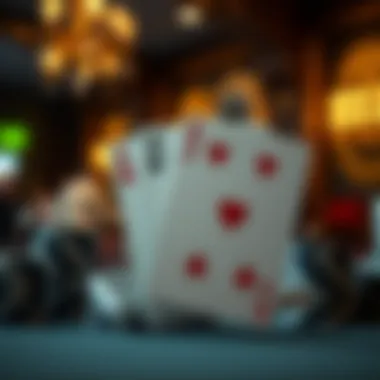

Intro
When it comes to blackjack, it’s not just a game of chance; understanding the cards can be a game changer. Each card carries its own significance, influencing everything from how much you bet to when you choose to stand or double down. Recognizing what each card entails adds a strategic layer to gameplay that can shape the entire experience.
In this exploration, we will unpack the core ideas behind card meanings and their implications. From beginner strategies to more advanced tactics, we’ll navigate how these meanings impact not merely the numbers on the table but the very essence of decision-making in the heat of the moment.
Game Strategies
Blackjack is a blend of luck and skill, and while fortune plays a hand, knowing the game strategies is essential to maximizing victory.
Basic Strategies for Beginners
It’s crucial for novice players to start with the foundations of blackjack strategy. Here’s what you need to keep in mind:
- Know the card values: Understanding that cards 2 through 10 are worth their face value, face cards are worth ten, and aces can be one or eleven depending on your hand is paramount.
- Hit or Stand: A common rule of thumb is to hit on 11 or lower, stand on 17 or higher, and know when to adjust your strategy based on the dealer's visible card.
- Basic Strategy Charts: Using a basic strategy chart can simplify decisions, showing when to hit, stand, double down, or split based on your hand against the dealer's card.
"Understanding the significance behind each card can keep you from losing your shirt at the blackjack table."
Advanced Techniques for Seasoned Players
For those who have more experience under their belts, delving into advanced techniques might provide that elusive edge. Here are some strategies to consider:
- Card counting: This entails keeping track of the ratio of high cards to low cards remaining in the deck. When the count is high, betting increases.
- Shuffle tracking: A method where players try to pinpoint the location of certain cards during the shuffling process to predict their appearance in the game.
- Betting strategies: Exploring progressive betting systems such as the Martingale or Paroli can help in specific situations, maximizing win potentials while mitigating losses.
Responsible Gambling
While the thrill of blackjack can be captivating, responsible gambling should always be at the forefront. The enjoyment of the game diminishes when players lose control.
Understanding Gambling Addiction
Gambling can easily turn from entertainment to obsession. It's necessary to be aware of the signs of gambling addiction:
- Spending more time or money than intended
- Hiding gambling behavior
- Experiencing anxiety or depression related to gambling losses
Tips for Maintaining Control
Here are a few strategies to keep in mind:
- Set a Budget: Before sitting down, decide on a budget you can afford to lose, and stick to it.
- Take Breaks: Frequent breaks can help clear your mind and stop you from making impulsive decisions.
- Know When to Walk Away: If you find yourself on a losing streak, accept it and don’t chase losses.
The world of blackjack is as much about psychology and strategy as it is about the cards. By understanding the significance of each card and employing smart gambling habits, players can enhance their gameplay and enjoy the challenge. With a thoughtful approach, even the novice player can become a savvy competitor at the blackjack tables.
Understanding Blackjack
When you step into the world of blackjack, you find yourself in a realm where strategy meets chance. The essence of the game lies not just in the cards themselves but in the layers of meaning they carry and how those meanings shape the gameplay. To truly grasp the significance of blackjack, it’s crucial to understand underpinning principles that guide every move made at the table.
The Basics of the Game
Blackjack is a card game that pits players against the dealer rather than against each other. At its heart, the goal is simple: get a hand value as close to 21 as possible, without exceeding it. Players receive two cards, and depending on the strategy employed, they can ask for additional cards to improve their hand.
Each card plays a role, contributing to the overall strategy. Number cards are valued at their face value, while face cards—kings, queens, and jacks—are worth ten. This is where understanding card meanings becomes vital; knowing how these numbers interact allows players to make informed choices.
Objective of Blackjack
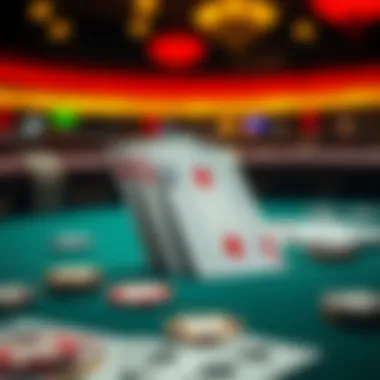

What separates blackjack from other casino games is its mix of skill and luck. The main objective is straightforward: beat the dealer by getting a higher hand without busting. However, this seemingly simple aim unfolds into a more complex narrative when you consider the decisions surrounding card values, dealer behavior, and player risk appetite. Understanding this primary objective helps players recognize the importance of each card and how they impact overall strategy.
Traditional Rules and Gameplay
While each casino may have slight variations, the traditional rules of blackjack provides a solid foundation for gameplay. Players start by placing their bets, after which the dealer dishes out two cards to each player, with one dealer card face-up for visibility. The choices that players have at this point—whether to hit, stand, double down, or split—begin to reveal the richness of card meanings.
When a player opts to hit, they're delving deeper into not just their own cards but also assessing probabilities and possible dealer outcomes. The decision to stand signals confidence in one’s hand but also an understanding of the dealer's visible card. The dynamics change whenever an ace is involved, further complicating decisions due to its flexibility of being valued at either one or eleven.
In the end, understanding blackjack means more than just knowing how to play. It’s about mastering the interplay of card meanings in gameplay, which can spell the difference between a strategic win and a novice loss.
"To navigate the blackjack table effectively, one must cultivate a keen awareness of all elements in play—from the cards in hand to the environment and dealer actions."
Whether you're a novice stepping into the gaming world for the first time or an experienced player honing your skills, a thorough comprehension of blackjack sets the stage for victories at the table.
The Significance of Cards
In the intricate world of blackjack, the cards you receive are the very foundation upon which your strategies are built. Understanding their meanings and how they interact during gameplay can profoundly affect your chances of success at the table. The significance of the cards extends beyond face value; it encompasses the strategic nuances that can either make or break a player’s fortunes. Knowing not just the values but also the implications behind each card equips gamblers with a powerful toolkit that influences how they wager, hit, or stand.
Card Values Explained
Each card has its own weight in the game. Familiarizing oneself with the basic card values is crucial. The cards numbered from 2 to 10 bear their respective values, while the face cards—kings, queens, and jacks—hold a uniform value of 10. Aces, however, occupy a unique space; they can represent either 1 or 11, which adds layers to how a hand can play out. This dual-value nature of aces significantly ramps up their importance in gameplay.
A player with a lower hand value has to rely more on strategic decisions surrounding these cards to mitigate their disadvantages. Knowing the values helps in assessing your position relative to the dealer, letting you make better decisions when facing unfavorable situations.
- Card Values Overview:
2 to 10: Face Value
Face Cards: 10 each
Ace: 1 or 11
"Understanding card values is a game changer; it’s like having the blueprint to a complex puzzle."
The Role of Face Cards
Face cards play a crucial role in blackjack strategy. Since they are valued at 10, having one or more in your hand places you in a favorable position to approach 21. Notably, face cards contribute to strong starting hands, often elevating the need to manage the betting strategy effectively. When you start with a combination of face cards, you present a strong figure to the dealer. That can create psychological advantages—both for you and your opponents.
Moreover, face cards create a scenario where players need to be wary of what the dealer might draw. For instance, if the dealer reveals a face card as their upcard, they are also likely to have a strong hand. This can drive up the stakes and tension at the table, as players must weigh their options carefully.
Key Points about Face Cards:
- Contribute significantly to achieving high starting hands.
- Can influence betting patterns around the table.
- Signal potential danger if the dealer shows one as an upcard.
Understanding Aces
Aces are arguably the most fascinating cards in blackjack. Their flexibility in game valuation allows for varied gameplay; you can either use it to boost your hand value to 21 or play it conservatively by treating it as 1. This adaptability provides players with multiple avenues for strategic play.
Most novice players tend to undervalue the impact of an ace. For example, holding an ace along with a face card gives a player a robust hand, which is known as a "blackjack." This strong position often leads to pushing for higher stakes when betting. Yet, the strategic use of aces extends beyond strong hands. Players should note how aces can influence the dealer's play and adjust their approach accordingly. Good players often leverage information about the dealer’s potential hand strength to make their decisions.
- The Power of Aces:
- High-scoring potential with either 1 or 11 value.
- Creates strong starting hands leading to blackjack.
- Influences how the dealer manages their hand, potentially stressing their decisions.
In summary, mastering the relationship between card meaning and gameplay can dramatically improve a player’s success rate. Each card tells a story and shapes the very strategic landscape at the blackjack table.
Strategic Implications of Card Meanings
In the world of blackjack, the specifics of card meanings go far beyond simple arithmetic. They serve as the building blocks of decisions that can sway the outcome of a game. Grasping the strategic implications of these meanings is not just advisable; it's essential for anyone looking to improve their gameplay. By understanding how different cards affect strategy, players can fine-tune their decisions, optimize their betting style, and adjust their overall approach to this strategic battleground.
Basic Strategy and Card Values
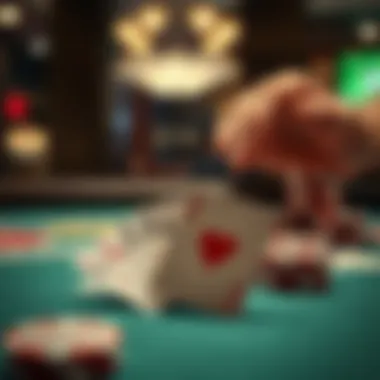

The basic strategy in blackjack hinges on knowing the value of each card in your hand and the dealer's upcard. The fundamental understanding of card values—where aces can be valued as either 1 or 11, the face cards clocking in at 10, and other cards having their face value—establishes a baseline for every decision thereafter.
For instance, if you know you hold a total of 16 and the dealer's showing a 10, you face a classic dilemma. Statistically speaking, standing can yield better long-term outcomes despite the inherent risk. Being aware of this strategy can build a sturdy framework around your approach.
- Soft Hands vs. Hard Hands: Recognizing the difference is crucial. A soft hand includes an ace counted as 11, providing more flexibility.
- Splitting Pairs: Understanding when to split pairs enhances your chances. Always split aces or eights but avoid splitting tens.
This basic strategy isn’t just a rule book; it’s a starting point that guides you through complexities as you evolve as a player.
Advanced Play Based on Card Interpretation
Once you’ve nailed the basic strategy, there’s a realm of advanced play to explore. This often involves the interpretation of the cards in ways that influence your actions beyond the standard rules. For instance, counting cards—a practice often met with skepticism—can imbue a player with critical insights into the gameplay.
Players who opt for this advanced technique often delve into a more analytical approach, tracking the ratio of high to low cards remaining in the shoe. An upward trend in high cards can sway your betting decisions; a decrease can make you tighten your bets. This shifts the advantage closer to the player.
- Adjusting Betting Patterns: If the count suggests favorability, increasing your bet might be wise.
- Recognizing Dealer Tells: Sometimes, it's not just about your hand. Observing how the dealer reacts to certain cards can lead to advantageous insights.
Being able to interpret card values on a deeper level allows for more fluid, dynamic gameplay, blending mathematical strategy with psychological insights.
Impact of Player Decisions on Outcomes
The final layer of strategic implications resides within the decisions made by the player. Each hand constitutes a crossroads—decisions only you can dictate based on the card meanings and your understanding of the game. The influence of behavior, choice, and emotional state can sway outcomes in unexpected manners.
Consider a player who consistently beats the odds but becomes overconfident after a series of wins. This player may forego calculated risks in favor of ego-driven bets, resulting in a dramatic shift away from strategy. Conversely, a player who remains grounded, adhering to strategy while attending to their emotional balance, can leverage card meanings to their advantage effectively.
Psychological Aspects of Card Meaning
In the realm of blackjack, understanding the psychological elements can be a game changer. The way players interpret card meanings influences not only their strategy but also the overall gameplay experience. Often, the meaning assigned to a card goes beyond its numerical value, tapping into how players feel or think about their chances of winning. Recognizing these psychological aspects can help in refining strategies and improving decision-making under pressure.
Player Perceptions and Misinterpretations
Every player approaches the game with a unique mindset. This subjective lens affects how they view the cards at their disposal. Misinterpretation can occur when players overemphasize card significance due to their past experiences or misconceptions.
For instance, a player might see an Ace as an absolute advantage, perhaps because of a prior win heavily influenced by it. In reality, Aces can also lead to a bust if not managed properly. This selective perception can skew decision-making and lead to poor betting choices.
- Importance of context: Players should recognize that the context in which a card appears must shape their view of its value. A low-value card drawn after a series of high-value cards can ignite a sense of vulnerability.
- Cognitive biases: Heuristics and biases can also blind players. For instance, the gambler's fallacy might prompt a player to think, "I haven’t seen a 10 in a while; I must get one soon," impacting how they play subsequent hands.
The Role of Intuition in Decision Making
Intuition plays a curious role in blackjack, intertwined intricately with mathematical strategy. Skilled players often develop a keen sense of what might happen based on their experiences, which can influence critical decisions at the table.
While it’s tempting to rely completely on instinct, seasoned players know it's best when coupled with strategy. This dual approach allows them to assess probabilities while remaining open to the nuances of the game.
- Training the gut feeling: Over time, players develop instincts through practice. Recognizing patterns in play can turn intuition from mere guesswork into informed decision-making.
- Balancing instincts: Understand that sometimes the cards speak louder than gut feelings. If the data suggests doubling down on a certain hand, lean into that rather than solely relying on inner voices.
Influence of Emotions on Gameplay
Emotions can swing players' decision-making processes dramatically. Whether it’s the thrill of a winning streak or the sinking feeling of a loss, these feelings can derail even the most calculated strategies.
Stress or excitement can cloud judgement, pushing players to make choices they might not ordinarily consider. The subtle buzz of adrenaline might compel someone to bet more than they intended, merely because the stakes feel thrilling.
- Common emotional triggers: Understanding what nudges your emotional buttons—like playing when tired or during high-pressure situations—can offer insights into your gameplay.
- Mindfulness: Practicing emotional regulation can enhance gameplay. Taking a moment to breathe and reassess decisions may save a player from regret later.
"In blackjack, it’s as much about the mind game as the card game."
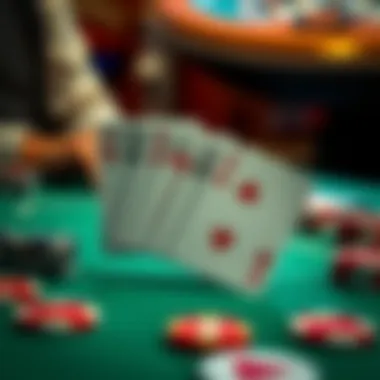

By taking the psychological aspects into account, players can improve their approach to blackjack. This understanding enhances one’s ability to navigate the game with both strategy and awareness, illuminating the path to better outcomes.
Common Strategic Errors
In the world of blackjack, each decision made can mean the difference between winning a hand or walking away empty-handed. However, many players, whether they’re newcomers or seasoned pros, sometimes trip up on the same basic mistakes. These common strategic errors can significantly affect a player’s success at the table, yet they often go unrecognized until it's too late. This section delves into these pitfalls, shedding light on their nuances and offering valuable insights to avoid them.
Underestimating Card Values
One of the main errors committed at blackjack tables is the underestimation of card values. Players may focus on their own hand without fully grasping the implications of the dealer's upcard. For instance, if a player is dealt a 10 and a 4, they might be content thinking they’ve got a decent hand of 14. They might ignore that the dealer is showing a 7, which indicates a potential strong hand.
Understanding that each card affects the overall gameplay is crucial. For example:
- High Cards (10s, Jacks, Queens, Kings): These cards often push the stakes higher. Players tend to favor hands with high-valued cards but might overlook the risk of busting if they draw again.
- Low Cards (2-6): While they may seem less significant, these cards can help create a bust for the dealer when they need to draw.
- Aces: The power of aces as either 1 or 11 can swing the tides, and failing to leverage their flexibility can cost players dearly.
Players need to rethink their hand in relation to the dealer’s showing card, evaluating risks versus potential gains more accurately. This means weighing how each card combination stacks up against the possibilities.
Ignoring the Psychological Element
In a game heavily informed by mathematics, it's easy to forget that blackjack also plays a psychological game. Ignoring this element can throw a wrench into even the best-laid strategies. For instance, players may get swayed by their emotions or those of others at the table, leading to poor decisions.
Recognizing psychological tendencies can provide players an edge:
- Reading the Table: Observing opponents may reveal their strategies. A nervous player might draw unwisely, while a confident one may double down even when it looks risky.
- Personal Intuition: Trusting gut feelings can guide you. Sometimes, going against common strategy based on the vibe of the game gives unexpected success.
- Emotional Control: Keeping a cool head is paramount. Getting frustrated can lead to chasing losses with illogical bets, steering the game off course.
"Blackjack Table: A battleground of strategy, card values, and human psyche, where each card dealt tells its own particular story."
Failure to Adapt Strategy
Failing to adapt strategy might just be the most crucial blunder a blackjack player can make. The game is constantly in flux, with every card reshaping potential outcomes. Sticking rigidly to a strategy without assessing the present situation is a recipe for disaster.
Players need to stay flexible:
- Adjusting to Deck Composition: Understanding how many high or low cards are left in the deck can help a player decide whether to hit or stand. The composition can significantly sway outcomes, and adjusting bets accordingly is vital.
- Responding to Dealer Trends: If the dealer has been busting often, it may be wise to play more aggressively. Conversely, if they consistently draw winning hands, angling for conservative bets might be more beneficial.
- Incorporating Feedback: If a strategy isn't yielding results, don’t hesitate to tweak or entirely reconsider your approach. This could involve switching from a basic strategy to a more advanced counting method for those that are comfortable.
The End: Mastering Card Meaning
Understanding the nuances of card meaning in blackjack is not just a trivial detail; it’s the backbone of effective gameplay. Without grasping the significance of each card, players may find themselves lost in a sea of assumptions and miscalculations. Mastering card meaning goes beyond memorizing values; it encompasses a broad understanding of strategy, psychology, and the dynamics of the game.
A solid command of card meanings allows players to make informed decisions about when to hit, stand, double down, or split, which drastically influences the outcomes. By acknowledging the strategic implications of card value and the role they play in gameplay, one gains a significant edge over casual players. This understanding can turn the tides in favor of the savvy player, making every hand a calculated risk rather than a random shot in the dark.
The Path to Improved Gameplay
Players seeking to elevate their blackjack experience should consider this educational journey as a roadmap to improved gameplay. This path involves several key elements:
- Study Card Values Carefully: Familiarity with the numeric and face card values allows you to quickly assess your hand and that of the dealer.
- Practice Strategic Decisions: Create scenarios based on card meanings to practice your responses. Simulations can sharpen your intuitions and strategies.
- Learn to Read Opponents: Understand that other players also interpret card meanings. Reading their behaviors could offer insights that help you navigate the game strategically.
- Engage in Reflective Play: After each session, reflect on your decisions. Were they informed by card meanings? Adjust as necessary to cultivate better habits.
This path enables not only tactical improvements but also enriches the overall gaming experience. When you start recognizing patterns and strategies based on card meanings, it shifts how you engage with the game entirely.
Balancing Strategy with Intuition
To strike a balance between calculated strategy and gut feelings is essential in blackjack. While the significance of card meanings provides structure to your game, the unpredictable nature of intuition must not be disregarded. Here are a few considerations for achieving this balance:
- Trust Your Instincts: After extensive practice, your gut will start picking up on nuances that numbers alone might not communicate. If something feels off, it’s worth a second thought.
- Adaptability: The nature of blackjack requires flexibility. Sometimes, the facts might suggest one route, but your experience tells you otherwise. Learn when to follow your head and when to heed your instincts.
- Emotional Awareness: Be conscious of your emotions while playing. Stress or excitement can cloud judgment, leading to poor decisions despite a sound understanding of card meanings.
- Feedback Loop: Use both strategy and intuition as feedback to one another. If a gut feeling leads to a loss, analyze why it happened against the rational card value strategy used.
The duality of strategy and intuition, when mastered, can lead not just to improved winnings but also to a more fulfilling and stimulating gaming encounter. Blackjack effectively becomes not just a game of luck but a complex interplay of intellect and emotional acuity.
"In every game of blackjack, there lies an opportunity to refine your ability to interpret not just the cards in hand but the subtle cues of the whole game."
By internalizing these principles and techniques, players can truly master the art of blackjack, taking command of the table with both confidence and skill.
For further reading and strategies, consider visiting Wikipedia, Britannica, or discussion boards on Reddit for community insights.



